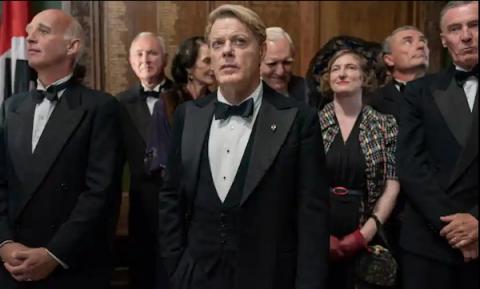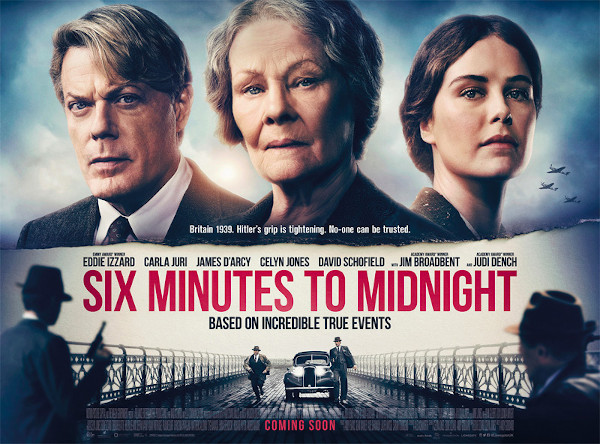An Eerie Plot and Hyperrealistic Narrative Dominate Thriller ‘Six Minutes to Midnight’

A peculiar, little-known episode that preceded World War II has offered a springboard of sorts for Six Minutes to Midnight, a new film starring and co-written by the legendary comedian Eddie Izzard.
For a period in the 1930s, there was a finishing school in South East England for the daughters of high-ranking Nazi officials. The girls were given lessons in English, tennis, customs, and proper behavior and manners. The school ceased operating in September 1939 — days before Hitler invaded Poland.
One can understand the appeal of the school’s setting for a film. Izzard, who grew up in the town where the school existed, reportedly spent years researching the school before devising a story with the Welsh actor and writer Celyn Jones. Director Andy Goddard (Downton Abbey, Doctor Who) collaborated with them on the screenplay.
This isolated historical event presents a challenge. If one were inclined to take a hyperrealistic approach to the narrative, you wouldn’t have much to work with because it’s essentially a snapshot of a finishing school. The wild twist is the fact that they’re young Nazis in training, poised to join English society and, perhaps, normalize their government-enforced ideology upon the young Englishmen they’re bound to marry. But that would require a “what if…” alternative history scenario, which doesn’t seem aesthetically ideal. The other possibility is simply showing the culture clash in the school: English educators struggling to contend with German teenage girls beholden to the Nazi Party.

There’s not really a story there. Yet, Izzard and his collaborators seemingly couldn’t shake off the shock of the alliance. How, for a brief period, did there exist a school with an insignia that features the German imperial flag, the UK flag, and a Swastika?
Without a conceivable enticing excuse for depicting the world of this bizarre moment in time, the screenwriters opted to wrap a third-rate spy thriller around the main setting. Izzard plays an instructor who’s hired by the headmistress (Judi Dench) for a trial period. Alliances and counteralliances reveal themselves predictably until we arrive at a murky, maybe even implausible, climax that tosses out a few hifalutin CGI fireworks.
This is a paint-by-numbers British Spy Thriller, and the setting isn’t enough to make the narrative singular. Dramatically useful information is coyly withheld for the sake of unsurprising reveals. Overall, it’s a strangely mundane movie — stoic, stodgy, straightlaced, and humorless. That’s not to suggest that the film should be a madcap, absurdist laugh riot (like Jojo Rabbit or The Producers). But some sense of originality — beyond that strange albeit authentic setting — is critical.

It’s worth mentioning that Six Minutes to Midnight (a rather outdated reference to the Doomsday Clock, if today’s moviegoers even know what that is) has a few unintentional laughs. It’s tough not to giggle when Jim Broadbent, when threatened with being scalded by the contents of a squealing tea kettle, says, with the kind of conviction that only a master craftsman can muster, “I’m not a bloody traitor. He’s half German, half English. I helped the English half of ‘im.” Broadbent, bravo. Screenplay, facepalm. Small wonders of ill-conceived dialogue will keep the sleepy viewer alert. Lines like “I believe the word you’re looking for…is ‘danke’” are a highlight amidst the drab color palette and the TV-style efficiency of the cinematography. Judi Dench’s flawless diction is always a treat, even when the lines are flavorless.
A final disappointment is the insufficient use of Izzard. He has a unique screen presence that deserves juicer roles. There’s something puckish and imperceptibly playful behind his eyes. His expressions tell a story. He has pathos, and that invaluable quality is hindered in the feeble story of the movie.
Six Minutes to Midnight was featured as part of the Cinequest Film Festival.
Author Bio:
Christopher Karr is a contributing writer at Highbrow Magazine.
For Highbrow Magazine































































































































































































































































































































